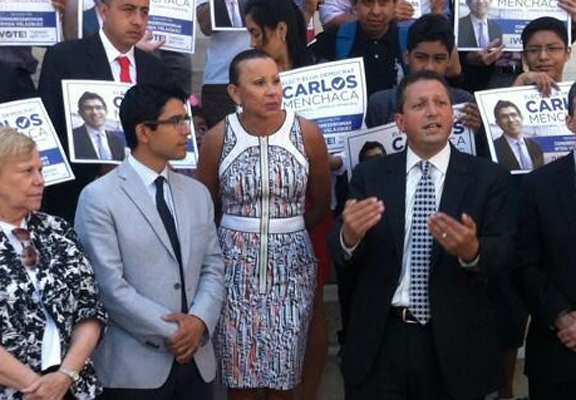
Carlos Menchaca accomplished a rare political feat on September 10 – he defeated an incumbent, Sara Gonzalez. He won by over 1200 votes out of a total of a bit more than 7,000. He won not only Red Hook and Windsor Terrace, two neighborhoods with which he has close ties, but Sunset Park, Gonzalez’s home turf. Menchaca’s resounding victory surprised many insiders and Gonzalez supporters. Menchaca came across as an earnest, capable young man with a winning smile, who stepped up during Sandy and became a valuable community resource. A closer look at the campaign though, reveals a more sophisticated strategy, run by professionals and supported by politicians with their own agenda.
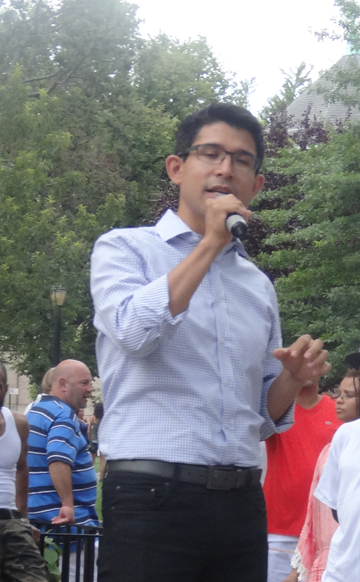
Red Hook became aware of Carlos Menchaca in the days and weeks following Hurricane Sandy. He was sent here by his employer, City Council Speaker Christine Quinn. Bicycling over from his home in the South Slope, he immediately plunged himself into neighborhood rescue operations that grew to be the Red Hook Coalition, which included Occupy Sandy, the Red Hook volunteers and ReStore Red Hook. He became a familiar face at daily emergency meetings both at the NYCHA houses as well as with the businesses on Van Brunt. Asked who that serious looking man making phone calls at a NYCHA meeting was, a gentleman answered, “That’s Carlos. He’s from Quinn’s office and he’s everywhere!”
Carlos proved to be a tireless campaigner, transforming his “everywhere” status from Sandy to much of the 38th District. Long days were spent knocking on doors in Sunset Park, Windsor Terrace and Borough Park – all part of the district. He moved to Red Hook in April, and was a familiar face at many local events, looking handsome in his white sports jacket, light blue shirt and striped tie.
Kickoff fundraiser March 6
The campaign began with a fundraiser at the home of David Mixner, a well known anti-war and gay rights activist at the beginning of March. Shortly after, he was endorsed by Nydia Velazquez and some important Red Hook business and real estate leaders. In a short time, $40,000 was raised. His job with Christine Quinn ended (she ended up endorsing Gonzalez), and so he was able to go into campaign mode full-time. By the end of the month the campaign hired a highly touted Democratic consulting firm, Red Horse Strategies. At the end of March the Brooklyn Paper ran a story on the race which contained both of his most important talking points – that Sara was absent during Sandy and was a do-nothing council member.
There is no doubt that Menchaca put his all into his campaign. His apparent sincerity won him countless friends in the district – people he met doing the hard work of door-to-door campaigning. However, he was basically an unknown, and had only six months to beat a well known and to many a well-loved incumbent.
Without the heavy lifting of Brad Lander and Nydia Velazquez, he might have been at best a fringe candidate. But Lander and Velazquez each had reasons for a change in the 38th, and Menchaca was their man.
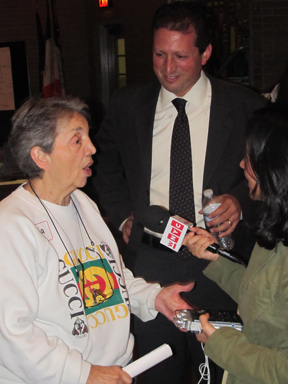
Endorsement a surprise
Brad Lander’s support came as a surprise to those who weren’t paying attention. Representing neighboring District 39, he had worked with Sara on many issues including parks, juvenile justice and transportation. It is unusual for a member of the council to support an insurgent. A reason for Lander’s endorsement was no doubt his leadership of the Council’s Progressive Caucus..
Following the 2010 elections, Lander and fellow council member Melissa Mark-Viverito founded the Progressive Caucus. They said at the time, “despite representing a huge Democratic majority of New Yorkers (47 of the 51 members are Democrats), the Council has played second-fiddle to powerful Republican mayors, and frequently yielded to real-estate and big business interests.”
They have been working to see that the next speaker is a progressive, more of an advocate to labor and social justice issues. Speaker Quinn was being seen as a rubber stamp for Mayor Bloomberg – especially his strong leaning towards real estate interests. Zoning is a power of the council, and the purpose of zoning is to provide a balance between evolutionary and radical real estate change.
Before this year’s primary, the caucus consisted of 11 members, including Margaret Chin, Steve Levin and Jumaane Williams. For this race, they endorsed ten candidates. They could not endorse Menchaca because they do not endorse candidates running against incumbents, but Menchaca will join the caucus when he takes office in January. The caucus will then boast more than a third of the council members, making them a powerful voice in the choice of Speaker and future legislation.
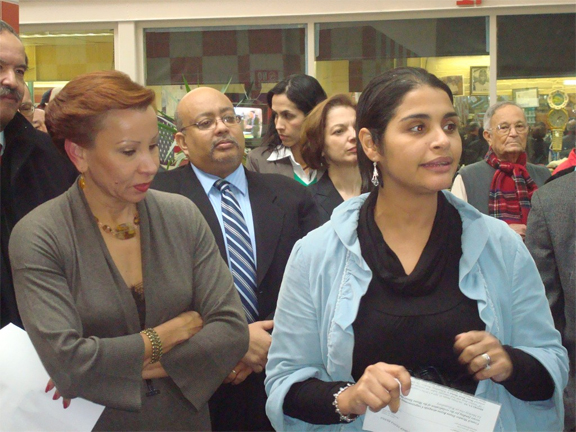
Congresswoman a prime mover
Nydia Velazquez, whose congressional district includes both Red Hook and Sunset park, had two big reasons for mentoring Menchaca – Vito Lopez was one, and her own power base the other.
Velazquez stated publicly that it was unusual for her not to support a Puerto Rican politician – especially a woman. But in this case she didn’t. While she claimed that Gonzalez was an ineffectual legislator, it was her loose ties with the Democratic establishment that irked Velazquez. The face of the establishment was Assemblyman and Chairman of the Kings County Democrats, Vito Lopez.
Rising from Bushwick
Brooklyn native Vito Lopez began his career as a social worker in Bushwick. In 1973 he founded the Ridgewood Bushwick Senior Citizen Council. He figured out how to get government funding and provided important services and jobs, helping the people of Bushwick. He became a power broker, gaining a seat in the State Assembly in 1984. He controlled much of Brooklyn politics from his seat in the State Assembly, where he was chairman of the Housing Committee. His power increased in 2006 when he replaced the indicted Clarence Norman as chairman of the Kings County Democrats. Vito’s role as Brooklyn political boss echoed Assembly Speaker Sheldon Silver’s role in Democratic politics statewide. Nydia’s history with Vito goes back to the 1980’s.
The ‘Bullwinkle’ district
In the spring of 1984, while working as an aide to Congressman Ed Towns, she was appointed to the City Council seat representing Bushwick and Williamsburg. She replaced the sitting councilman, who was forced to resign on corruption charges. She ran for election that fall, losing to Victor Robles, who moved to the Council from the State Assembly. The vacant seat was won by Lopez in that same election – a seat he held until being forced to resign this year.
After that, her only electoral loss to date, she took a series of jobs representing the government of Puerto Rico. In 1991, she began planning her next race, representing the 12th Congressional District in the House of Representatives. Newly redrawn, the 12th included Bushwick and Williamsburg, as well as parts of Manhattan, Queens and Sunset Park and Red Hook. Nicknamed the Bullwinkle district for it’s shape, it was drawn to tie together Hispanic communities for the purpose of bringing more Hispanics to congress.
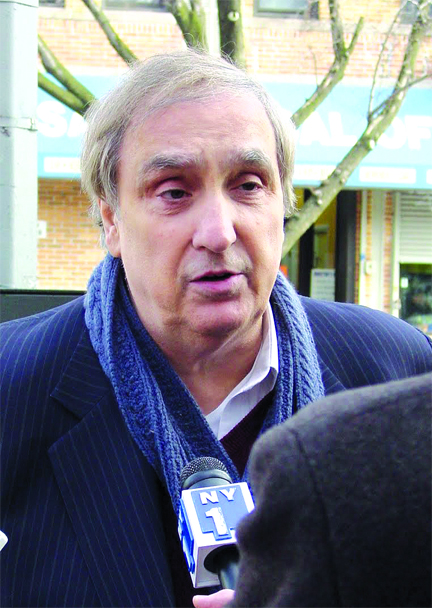
Vito Lopez, whose Bushwick machine backed many successful candidates, originally promised his support, but then reneged. She did have the backing of fellow Puerto Rican Dennis Rivera, who had recently become head of 1199 SEUI, the healthcare worker’s union. She ran a strong campaign, and defeated five candidates, including Congressman Stephen Solarz, and Lopez’s Hispanic candidate, who had the backing of future mayor Rudy Giuliani.
Dirty trick
During the period between the primary and the general election, the NY Post received some private health information regarding Velazquez. It was either an attempt to sabotage the November election or simply mean spirited. It has been suggested that Nydia held Lopez responsible for this dirty trick. Nydia handled the resulting front page Post story with dignity, and easily won the November election and became the nation’s first female Puerto Rican congressional representative.
Redistricted again
Angel Diaz, the Republican candidate defeated that November, filed a federal lawsuit claiming the 12th District was drawn illegally. It was originally created to conform to Federal guidelines encouraging minority representation. A subsequent Supreme Court decision ruled that some states had gone too far. Diaz won the case and the district ordered redrawn in advance of the 1998 election, reducing the Hispanic portion by about 30%.
In an article in advance of the fall campaign, the NY Times wrote:
“So far, two elected officials who represent Brooklyn have indicated their strong interest in running against her (Velazquez). But both officials, City Councilman Martin Malave-Dilan and Assemblyman Vito J. Lopez, insist that they are so intent on seeing the Congresswoman defeated that they each would withdraw in deference to the other in opposing Ms. Velazquez in the September Democratic primary.”
‘’She’s alienated just about every part of her constituency,’’ Mr. Lopez said. ‘’She has challenged people in every part of her district and that has made many people unhappy with her.’’
Said Mr. Malave-Dilan: ‘’I think a race against her is very winnable. It seems that her base of support has diminished over the last three years.’’
Neither Lopez nor Dilan ended up running, but it is indicative of the enmity that existed between Lopez and Velazquez. Despite Lopez’s characterization, has continued to win re-election every two years.
The following year the rivalry flared up in a race for civil court judge. City Limits, in 1999, wrote:
“Politically, there’s much more at stake than one judgeship: It’s a proxy for a more significant and entrenched competition between two powerful Brooklyn democrats–Congresswoman Nydia Velázquez and state Assemblyman Vito Lopez. “On the merits, both candidates would be good judges,” remarks one City Council aide. “What makes this interesting is the political lineup behind it.”
That race never happened, as the Lopez side challenged the petitions of their opponent and won in court.
Domino & the Broadway Triangle
Velazquez and Lopez fought on real estate issues as well. The Domino Sugar factory complex, on the Williamsburg waterfront, was bought by developers in 2004. A five year community process began where issues such as density, affordable housing, and zoning resulted in a 2010 plan.
The plan, which included over 600 subsidized apartments (and 1600 luxury co-ops), and a group of 40 story towers, was hailed by Velazquez along with her new ally, council member Diana Reyna. Reyna, once a member of Vito’s staff, had broken with him and were now enemies. Vito along with another former staffer, councilman Stephen Levin stood on the other side of this issue – claiming the towers were too high and density too great. The project is still in the planning phase, although the original developers dropped out.
The Broadway Triangle is another real estate tangle involving Velazquez and Lopez. This Triangle lies between on the borders of Bed-Stuy, Williamsburg and Bushwick. At one time, Pfizer was the major tenant and employer in the area. The area became downtrodden and a candidate for redevelopment. In 2009, the zoning was changed and the Bloomberg administration gave the United Jewish Organization of Williamsburg, a Hasidic organization, and Lopez’s Ridgewood-Bushwick Senior Citizen’s Council, contracts to build low income housing. The resulting plans were deemed discriminatory in favor of the Hasids to the detriment of the black and Hispanic community. A neighborhood coalition representing the black and Hispanic residents was formed with the backing of Velazquez and Reyna, and filed suit against the city, claiming the plan was racially biased. The city lost the first round in the court case, and much of the area remains in limbo.
New Kings Democrats
In 2010, Velazquez backed Lincoln Restler, a fresh-faced candidate for District Leader whose parents helped found the New Kings Democrats (NKD). Formed as a counterpoint to the Kings County Democratic Committee, and their chairman, Vito Lopez, the NKD serves, among other things, to be an incubator for progressive Democratic candidates. Nydia was an early friend and helped give the club credibility. She remains close with Restler, who served as MC for her inaugural last January in downtown Brooklyn. The New Kings endorsed Menchaca and helped with his campaign.
2012 campaign another Lopez/Velazquez slugfest
Last year, Vito Lopez convinced councilman Erik Dilan, son of his friend and political ally State Senator Martin Malave-Dilan, to run in the newly created District 7 against Nydia. Velazquez ran a spirited campaign and at her victtory party in Williamsburg, relished her victory against the Lopez backed candidate. Carlos Menchaca, now employed by Speaker Quinn, and also the co-president of Lambda Independent Democrats, volunteered for Nydia. His future campaign manager, Ivan Luevanos, was a guest at the victory party.
A chance encounter with Paul Bader, Nydia Velazquez’s ex-husband, suggests an even earlier connection. The night of his primary victory, after, hosting a party in Sunset Park, Menchaca and his Red Hook supporters gathered on Van Brunt Street at Hope and Anchor. Bader confided that the victory was planned two years ago.
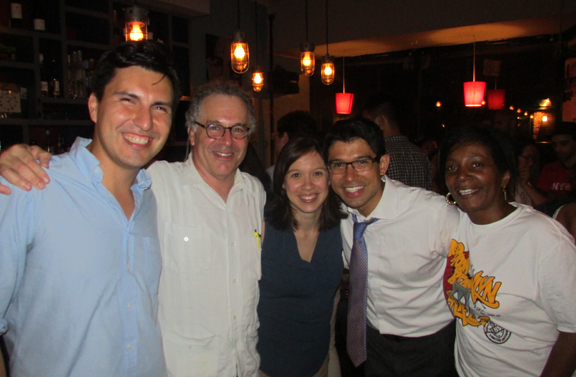
Paul Bader is a Manhattan based printer who lives in Brooklyn and has been active in local politics since the 1970’s. He is well known in Democrat clubhouses.His company prints campaign literature and palm cards each electoral season. He ran for City Council in 2002, losing to Bill de Blasio in the Democratic primary. He has been head of the political action committee of Buddy Scotto’s Brooklyn Independent Democrats, and in fact it was Buddy who introduced him to Nydia Velazquez.
Having both Nydia Velazquez and Brad Lander mentoring Menchaca suggests that his election was not exactly as he describes it in a recent Brooklyn Eagle interview.
“Months into the recovery effort, residents started asking him to run for office, he said. “People used to say to me, ‘Carlos, you can’t leave us. You need to stay here as our councilman.” I started to re-think everything,” he said.”
Having an indebted ally in a large part of her district is akin to the kind of politics that was practiced in Bushwick before Lopez lost it all. Nydia also was directly involved in two other local council races.
As mentioned before, Steve Levin, now a member of the Progressive Caucus, often seen with Brad Lander, has a Lopez connection. He has become a popular politician in his own right, representing Brooklyn Heights, Park Slope, Boerum Hill and parts of Williamsburg. In normal times, he would probably have ran unopposed this year. But with the support of Nydia and the New Kings Democrats, making Vito Lopez’s influence his main platform, Stephen Pierson mounted a campaign (ultimately unsuccessful).
Vito Lopez himself, who had resigned from the State Assembly due to mounting corruption charges, attempted a comeback by running for Nydia’s old Council seat. His race was against Antonio Reynoso. Reynoso is yet another former chief-of-staff, having worked for outgoing council member Diana Reyna.Nydia made sure her influence was felt in the race. She spent election day in Bushwick, doing some last minute campaigning for Reynoso. Back in January, she and Diana introduced him as candidate. Somewhat surprisingly, Reynoso defeat Lopez quite handily.
Nydia can now claim credit for bringing in two new progressive council members representing different parts of her district. And of course, she is almost assured of their support in the future.
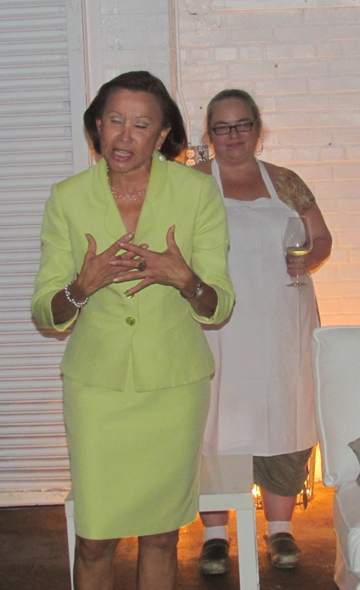
Carlos’ campaign
Menchaca had a well defined campaign strategy right from the start. In that March, 2013 Brooklyn Paper article, he was quoted saying, “After Sandy, people kept asking, ‘where’s government, where’s our leaders?’” claimed Menchaca, a former aide to Borough President Markowitz and City Council employee. “That council office had a lot of potential to help people, and my opponent just wasn’t there.”
In fact, Sara and members of her office spent a good deal of time in Red Hook before, during, and after the emergency, including time with the representative from the Speaker’s office. Yet the frequency of his charge gained credence and for many, accepted as gospel.
His other claim was that Gonzalez was a no-show politician, with an abysmal attendance record in the council. This was also accepted as truth, yet a fact-check reveals otherwise. From 2006-2009 her attendence rate was just above 82%, with the average rate of all council members at 84%. Her campaign claims a recent record of 91% attendance, but it was a message that did not get out.
Gonzalez’s absence of a sophisticated, high-tech campaign hurt her ability to refute these charges. A lifelong resident of Sunset Park, with a long history of community activism, Gonzalez probably expected her resume to speak for itself. Perhaps she saw it as unnecessary, having won easily in her previous three races, she may not have expected such a vigorous opponent with a formidable subtext.
Carlos Menchaca, 33, was born in El Paso, Texas. He graduated from the University of San Francisco in 2004, with a degree in Performing Arts and Social Justice, as well as a BA in Politics. After graduation, he came east to work for Brooklyn Borough President Marty Markowitz as his Capital Budget and Policy Coordinator.
Menchaca’s responsibilities included advocating for the Atlantic Yards and the City Point developments. These are both large Downtown Brooklyn real estate projects, and have both been controversial, involving what some considered unfair displacement and unfair labor practices.
Menchaca represented Markowitz on the board of Brooklyn Economic Development Corporation, and worked to bring marketing firms to Dumbo. He served as a judge at the Brooklyn Chamber of Commerce’s 2009 Building Brooklyn Awards.
In March, 2011, he left the Borough President to take a job with Speaker Quinn’s office. He became GBT & HIV/AIDS Community Liaison. It was in this capacity that he first met Red Hook’s Monica Byrne. In an interview at her restaurant, Home/made, Byrne told the Star-Revue that in the summer of 2012 she was having difficulting securing Coffey Park for a Gay Pride event. She reached out to Quinn’s office and found Menchaca capable in solving her problem.
She reconnected with Menchaca during Sandy, as they worked together providing local relief. For the campaign, she hosted a meet and greet for Carlos which also featured Nydia. She says that she is excited about the prospect of having someone living in Red Hook representing the community in the City Council.
Lambda Democrats
Unlike Sara Gonzalez, who came to politics via community activism, Carlos’ route included the political clubhouse. He joined Lambda Independent Democrats of Brooklyn (LID) in 2009, and became a co-president in 2012. A political club is where an aspiring politician gain important contacts, learn the system of political alliances, and how campaigns actually work. They are almost like a trade association for politicians. Menchaca was a frequent visitor to the Central Brooklyn Independents (CBID) and received their endorsement early on.
As co-president of LID, Carlos became a delegate to the 2012 Democratic National Convention. In January he attended the Obama inauguration in Washington. Within a week of returning to Brooklyn, he filed with the Board of Elections to run in the Council primary, and began looking for Red Hook residency.
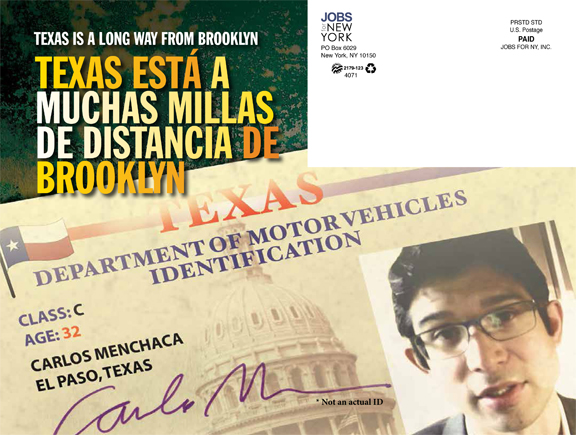
Sleazy advertising
Many Menchaca supporters say that Sara Gonzalez ran a dirty campaign. What they point to are the PAC mailings done on behalf of Gonzalez by the Real Estate Board of NY (REBNY). No doubt scared of the impending large-scale turnover of the council, REBNY, financed largely by wealthy real estate developers, spent over $4 million in local council races throughout the city mostly against progressive candidates.
The Real Estate Board’s involvement was made possible by the Supreme Court Citizen’s United decision that essentially created Super PACS. These groups are allowed to spend whatever they want on behalf of candidates, as long as the support is not coordinated with the candidates or their campain. Admittedly, this is hard to prosecute. The Gonzalez campaign claims they had no say as to the REBNY mailings that clogged mailboxes during the summer.
In July, REBNY spent almost $80,000 on positive campaign mailers promoting Gonzalez. Menchaca was not mentioned at all in them. Starting about a month before the primary, they sent out negative mailers calling Menchaca an outsider. He was painted as a “political operative and bureaucrat seeking to advance his own career.” One used a graphic of his Texas driver’s license, trying to give the mistaken impression that he was a newcomer to New York.
While Menchaca did in fact move into the district at the end of March, he has lived in Brooklyn since taking his job with the Borough President around the beginning of 2005. He has lived near the district, in Park Slope/Windsor Terrace. The cards were misleading and Menchaca has called them racist and xenophobic. The average voter probably had no idea though that these cards did not come from Sara’s campaign.
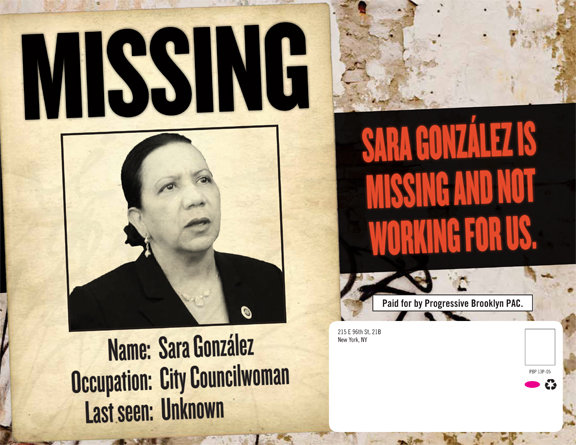
REBNY spent a total of over $354,000 on the race, with about $54,000 of it in negative advertising. The Menchaca campaign itself was the recipient of at least $135,000 in PAC money, with at least $33,000 of it going negative against Gonzalez, calling her a no-show and worse. In addition to the PAC-sponsored negative campaign mailers sent out on behalf of Menchaca, the Menchaca campaign itself sent out at least one card proclaiming Sara Gonzalez a failure, a no-show and missing in action after Hurricane Sandy. This was also a false message, but they had a huge impact, especially to newcomers to the district.
In addition to the mailers, someone set up a fake twitter account mocking Gonzalez. The Menchaca campaign suggests that Gonzalez could have disavowed the REBNY mailers, just as Menchaca could have disavowed the Twitter account. Sample tweets purporting to come from Gonzalez included: “I’ve had a few chardonnays, what of it?”, and “I’d get out the vote, except that would require getting out.” Others were more disrespectuful.
The Menchaca campaign spent over $90,000 with Red Horse. That money went for consulting, creation and production of mailers, palm cards and robo-calls. Red Horse’s political clients have included Andrew Cuomo, Eric Schneiderman, Bill deBlasio, and Nydia Velazquez. Based on their website, they seem to specialize in negative advertising. The messages and design of the samples they show on the website are similar to mailers paid for by Carlos for Council, the Progressive Brooklyn PAC and the NYC Central Labor Council. The Progressive Brooklyn PAC, a creation of Metropolitan Public Strategies, spent over $38,000 on the Menchaca campaign.
Metropolitan Public Strategies is a new political consulting firm started this year by Neil Kwatra, former top aide to NY State Attorney General Eric Schneiderman. His big client in this year’s primary was Ken Thompson, who upset District Attorney Charles Hynes. Thompson was also endorsed by Nydia Velazquez. Thompson and Menchaca campaigned together at times, joined by Nydia Velazquez.
The Menchaca campaign was the recipient of $91,646 from a PAC run by the NYC Labor Council. Most of this consisted of a double sided flyer aimed at getting out the vote, and was printed in English, Spanish, and several Chinese dialects, reflecting the ethnic makeup of the district. The Central Labor Council is an umbrella group for AFL/CIO unions in NYC, including hotel workers and hospital services. Their PAC supported Menchaca and only one other candidate running for Council, as well as Scott Stringer. In a press release issued shortly after the primary, they stated, “We supported bright, young minds like Carlos Menchaca, who broke through nearly a decade of community neglect, and is committed to fighting for the values of working people in Sunset Park and Red Hook.”
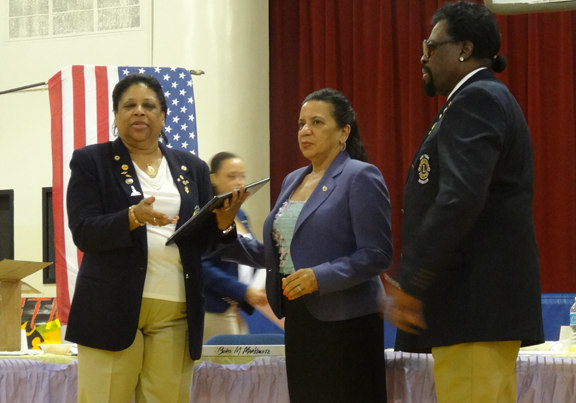
Sara Gonzalez’s campaign boasted no top-notch, media savvy, hustling PR firms. Her campaign was a more traditional, old-style campaign. It was run by the same loyal friends and volunteers who ran her previous campaigns. They seemed to depend on the same voters who had supported her. Menchaca’s people were able to reach many who had not voted before and were susceptible to his message.
The Gonzalez people were blindsided, only slowly realizing the strength and savvy of the battle being waged against them. Sara Gonzalez had run three successful campaigns in the district. Her first one was a special election to replace Angel Rodriguez in November, 2002. Rodriguez had been caught trying to bribe Greg O’Connell and removed from office.
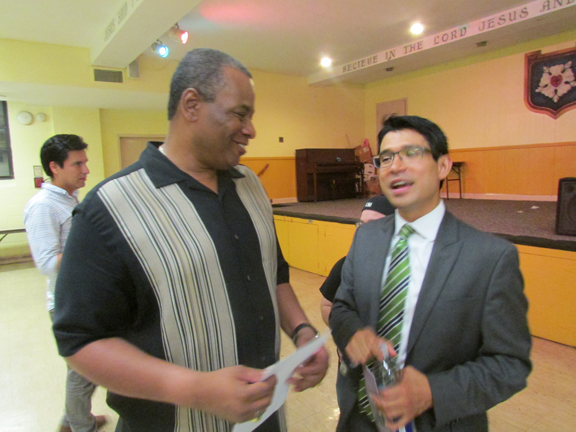
She entered the race as a community activist, most recently the Chairperson of Community Board 7. She was born and raised in Sunset Park, a graduate of Fort Hamilton HS. She was 53 years-old, and had never belonged to a political club. She had been an AIDS activist in the 1980’s, and worked extensively with youth, including the Hispanic Young People’s Alternatives. Her Board of Elections statement of 2002 concluded:
“Sara will be representative of the desires of the community, not politics, whether of a supposed new or of the old as usual varieties. Electing her will usher in a new era of community initiative to the City Council!” One can imagine Carlos making the same statement today.
Carlos Menchaca will be the next Council Member for the 38th District. Brad Lander will gain a member in his Progressive Caucus, bringing with it additional leverage in the choice for a new Speaker. Nydia Velazquez gains a faithful ally and further proof of her political power in Brooklyn. Red Hookers gain a councilman who lives in the neighborhood.
In a statement to a reporter of the Red Hook Star-Revue, Carlos Menchaca thanked the Chinese community, the Muslim community and the Jewish community, with a nod to his LGBT backers and his Mexican heritage. These are his words:
“This is a dream come true not just for me but for so many people in the community that have been wanting real, active, visible, vocal voice in the city council. We made history. I’m going to be the first Mexican American elected into the city council. The first LGBT openly gay person in Brooklyn. Those are big things for those communities but its actual a big thing for the entire community that wants representation; from the Jewish community, to the Muslim community, to the Chinese community. They have been asking for voice for a long time now they have it. We created a coalition that’s incredibly strong. You saw it on September 10th with that election that came out. We won big! We won big and that’s a big moment for this community and this is just the beginning. We are gonna work hard. We are going to work hard together and I’m going to go back to those doors that said yes they are gonna support me and make sure they come out and give them an opportunity to access government. Give them an opportunity to voice their concerns so that they get what they need from government. And that’s our mission, that’s what we’re gonna do.”









One Comment
Absolutely awesome! And I was part of Carlos’s campaign. I came all the way from the Bronx every weekend for at least 3 months to help Carlos as much as possible, because I thins he’s really fantastic!